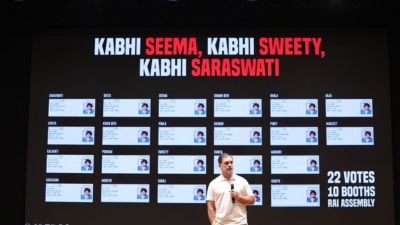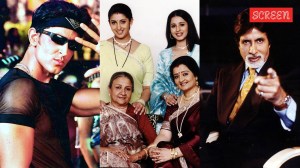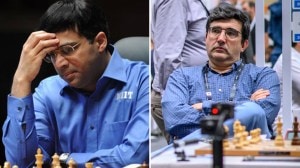‘She (Indira Gandhi) did think Emergency was a mistake. She was never quite at ease with it’
• Since you know my guest today so well let me first tell you about this remarkable setting. This is Swaraj Bhavan, part of the larger ...

• Since you know my guest today so well let me first tell you about this remarkable setting. This is Swaraj Bhavan, part of the larger Anand Bhavan complex in Allahabad, the home of the Nehru-Gandhi family, and my guest today, somebody who carries that formidable dynasty on her slender shoulders if I can put it like that
Welcome to Swaraj Bhavan
• Thank you for finding the time in the very busy election season
Yes, very busy. In fact I have been touring Uttar Pradesh, Orissa and other states…only yesterday I was in Benares, Badhoi, Mirzapur. And it’s going to carry on like this till the end.
• Life changes a great deal. Let me go back to where it began, when did you first come to Anand Bhavan?
I came to Anand Bhavan in 1970 and that was when Indiraji dedicated Anand Bhavan and Swaraj Bhavan to the nation, in terms that it became a museum, open to the public. That was 1970, I had been married for two years, I was mother of a young baby, Rahul.
It left a great impression on me. My mother-in-law was winding up, deciding which things to leave here or take, there were still some personal items here. She was describing to me —and one of the friends who had accompanied us —what all happens in both these houses.
• From whom did you first hear about the freedom movement and the politics of those years? From Rajiv or your mother-in-law?
Certainly from my mother-in-law. In fact, whenever she was free or when you were — seldom though — holidaying with her, she would always recount and tell us about her childhood, her youth, which, of course, was part and parcel of the freedom struggle.
• But you never imagined at that point that either your husband or you would ever get caught up in this?
No, never. I never imagined that. I had just come here for marrying Rajivji. And that never crossed my mind or my husband’s mind for that matter.
• But you never thought when you got married to Rajiv that you were marrying into a political family?
When I came to this family, I was a complete anaari on what was going to come.
• Anaari means novice, but it’s not an apt translation…
But you know what it means. Here, this house, they moved in here precisely about 104 years ago, Motilal Nehru. And Mahatma Gandhi came here in 1919. And that was when Motilal Nehru was persuaded by Mahatma Gandhi and by his son to join the movement. And in 1919 when the non-cooperation movement was launched, it was in this courtyard that they made a huge mountain of all imported matters, mostly dress materials, and they made a bonfire as a symbol of rejecting foreign goods.
• But when you came here in the 1970s, you were much more an Italian than an Indian…you were here for a very short time.
Yes, at that time I was adjusting…adjusting to life here, to ways of thinking, but that is something that happens to every young bride when she gets married.
• Because India at 1968, 1970 was very different from India 2004. And for somebody who came in from Europe, it would have been serious adjustment issues.
Well, there were many similarities of mindset, cultural, at least of that period, of the country that I came from and India.
• Give me some examples of similarities…
Of family bonding, the way the family is together, respect for certain values. But of course I can say that there was certain amount of adjustment, which had to be made. But it wasn’t as difficult as perhaps…
• …as you may have imagined before you came here?
Frankly, I came here because I was madly in love with my husband, and he was with me. So nothing else mattered. It didn’t matter what I had to face…and that also helped.
• But did you have any apprehensions, kabhi ghabrahat hui aapko?
No, ghabrahat nahin, at least I can’t recollect any such ghabrahat. The fact that it does not remain in my mind means that there wasn’t such a major — there was sort of adjustments perhaps of food or dress, little little things. My mother-in-law was very understanding, and she tackled me very cleverly unlike perhaps some other mother-in-laws I know who force their daughter-in-laws to be, you know, ‘you have to do this…’ She allowed me to be myself. She didn’t force me to into things that she felt I could be uncomfortable with, and I think that was a very intelligent way of tackling me because on my own I slowly slowly adjusted, and did things that if perhaps, had she told me to do I wouldn’t have done.
• Like what?
For instance, if we go to a wedding, you have to wear a saree. Or you have to eat Indian food…slowly slowly I started eating Indian food and now I can’t do without it.
• Then in Delhi you didn’t get much pasta, but now you do — half the Punjabi chefs in Delhi make pasta…
Yes, I know, but I am very fond of Indian food. In our house, we eat mostly Indian food. Occasionally, some friends come and ask for pasta, then it is made.
• Do you cook?
No. I used to when my husband wasn’t in politics. I used to look after my family, I used to look after my mother-in-law, and she did occasionally enjoy western meals, so I used to…but when I got married I didn’t know how to cook. I had to learn from books and recipes.
• So what were your mother-in-law’s favourites?
Well, she did enjoy pasta, occasionally.
• That’s what your critics say sometimes: Congress party ka ek hi raasta, bolo Italian khao pasta. Have you ever heard it?
(Laughs) Yes I have heard it.
• Tell me, what else did you learn from your mother-in-law? She was a tough woman.
She was a very strong woman, but she had a very gentle side to her…a side that very few people know. She had an eye for detail. If someone was unhappy or unwell, she would immediately notice and she would immediately do something about it. Perhaps by jotting down two lines. For instance, I remember when I got married, my mother came to the wedding and she stayed for a month. And when she was going, obviously it was a sad moment for me. And my mother-in-law sent a little note to me: ‘Hi Sonia, this is just to tell you that we all love you’. And that totally melted me. It gave me a lot of strength, that I am loved and cared for.
• Do you have any recollections from that time of her responses to things that were happening in India which showed her character to you…something that made her angry, something that made her very determined?
She was at her best when faced with challenges. If she was pushed to the wall, there was pressure on her, she would come out and really fight back.
• Give me some examples…
When there was a split in her party…
• In 1969
Yes, she came out and fought. I remember the elections for the president at that time.
• Sanjeeva Reddy and Nijalingappa…Reddy was the presidential candidate.
Yes, that was a time when she came out strongly and aggressively.
• Was that the first time when you saw her as the iron women as she came to be known as later?
Yes.
• And the Bangladesh war, do you recollect any of that?
Yes, Bangladesh war was a very exciting moment for all of us, we lived every moment of that crisis in our family. And I remember when Mujibur Rahman came to Delhi from London, there was a big reception at the airport, even though I was about to deliver my other child the next day, I made it a point to be there at the airport. There was such excitement.
• What was the conversation on your dining table like during the days of the war?
Well, mostly we were getting reports of the atrocities by the Pakistani army on the people of Bangladesh. Then the crisis of — I think we had 10 million refugees — coming in from Bangladesh. Nowadays when you read about 3 million refugees, a couple of hundred thousand refugees, the whole world…
• But during those 13 days of the war, is there something that Mrs Gandhi said at the dining table that you remember?
Obviously, she won’t come out with the details, but she would certainly talk that today this happened, they have killed so many people, so many refugees have come in. Throughout that period she was composed, calm.
• The other turning point in her political career, the Emergency. What side of her did you see then, and how did you and Rajiv respond to the Emergency?
Well, my mother-in-law herself, after she lost the elections, she did herself say that she had a rethink on that. And the very fact that she declared elections proves that she had a rethink on the Emergency.
• Do you think that she really thought that it was a mistake?
I think she did think it was a mistake. Don’t forget that, at least the Indira Gandhi I knew, was a democrat at heart, to the core. I think circumstances compelled her to take that action. But she was never quite at ease with it.
• But did it come across at conversations at home, that she was not at ease with it? That she wanted it to be over?
Yes, there were instances, through what she said, her comments, from which one could understand that. I can’t recall any particular instance but I can recall that at times she was uneasy about it.
• After that, the Opposition, the public opinion responded to Emergency. Remember that slogan? Emergency ke teen dalal, Indira, Sanjay, Bansi Lal, that public rejection…was that a low moment in the family as well?
Well, there is no way we can say that the Emergency was right. She herself said it wasn’t right. But there was a great deal of propaganda against Mrs Gandhi, deliberately done. And I think there were even some reports post-Emergency that went into details of the family planning programme which turned out to say that the problems were magnified. Yes there were problems, but not in the scale that the Opposition had built up.
• But Emergency was a lesson that no government will repeat such a thing. It is not possible to bring in so much authoritarianism in India, the Indian system will not accept it.
I guess yes, but those were different times.
• Do you remember this coming up between Mrs Gandhi and Rajiv or between Sanjay and Rajiv at that point?
I do remember, but I wouldn’t like to disclose it.
• 25 years have gone past, may be you should.
May be another 25 years, may be I’ll write it some day
• But can you say that this is something that one can make a reasonable guess as to what the conversation was?
Well, I said I wouldn’t like to discuss it now, may be another time.
• But there is a certain irony to the fact that one member of your family who was so involved in the Emergency, namely Sanjay, his family is now on the other side.
Well, I can only say what I said the other day, he (Varun Gandhi) is a young man, he is embarking on a political career, I wish him well.
• Does it cause unhappiness — I wont say bitterness — in your mind? These are visceral issues in our politics: to be with the BJP or not with the BJP. And if one section of the immediate Gandhi family goes that side, does it hurt you? Not politically, I mean personally or ideologically?
In some ways, it is painful. You are here in this house where the freedom movement took place, where strategies for the course of the movement were envisaged, this house symbolises the freedom movement…it symbolises not only the fight against the British, but also a fight against communal forces. My mother-in-law was born here and other members of the Nehru family, stalwarts of the freedom movement came here, they lived and died upholding certain principles…and secularism, this principle, the fight against communal forces of all kind, was very much core of…
• And direct descendants of that family go and join the BJP now, does it amount to betraying that legacy?
I would not like to comment on this, I wish my nephew all the best.
• That you should even if he were a political opponent. But I am just talking in philosophical terms. Would it hurt less if he were in another party than the BJP?
I would rather not go beyond this.
To be continued





- 01
- 02
- 03
- 04
- 05


























